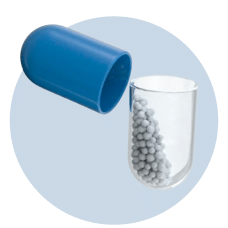Mefilong-P Suspension
Prescription Required
Your child’s medicine at a glance
Mefilong-P Suspension is a nonsteroidal anti-inflammatory drug (NSAID). It helps to lower body temperature (fever) and reduce pain and inflammation (redness and swelling) both in infants and children. It works by blocking the action of a chemical messenger that is known to cause fever, pain, and inflammation.
Adhere to the prescribed dose, time, and way while giving Mefilong-P Suspension to your child. Give it orally before or after food, preferably at a fixed time. However, prefer giving it after meals as this will prevent the chance of developing an upset stomach. If your child vomits within 30 minutes of taking this medicine, give the same dose again. Avoid giving more than the recommended dose for fast relief as that may cause unwanted effects in your child.
Your child may exhibit side effects like nausea, vomiting, stomach pain, heartburn, and diarrhea after taking this medicine. These side effects are temporary and are likely to subside once your child’s body adapts to the medicine. In case they persist or become bothersome for your child, do consult your child’s doctor on a priority basis.
Before administering Mefilong-P Suspension to your child, do inform the doctor if your child is allergic to any medicine or products, or has a history of any heart problems, birth defects, liver disease, kidney disease, lung disease, or bleeding disorder. This information is critical for dose alteration and helps in planning your child's overall treatment.
Adhere to the prescribed dose, time, and way while giving Mefilong-P Suspension to your child. Give it orally before or after food, preferably at a fixed time. However, prefer giving it after meals as this will prevent the chance of developing an upset stomach. If your child vomits within 30 minutes of taking this medicine, give the same dose again. Avoid giving more than the recommended dose for fast relief as that may cause unwanted effects in your child.
Your child may exhibit side effects like nausea, vomiting, stomach pain, heartburn, and diarrhea after taking this medicine. These side effects are temporary and are likely to subside once your child’s body adapts to the medicine. In case they persist or become bothersome for your child, do consult your child’s doctor on a priority basis.
Before administering Mefilong-P Suspension to your child, do inform the doctor if your child is allergic to any medicine or products, or has a history of any heart problems, birth defects, liver disease, kidney disease, lung disease, or bleeding disorder. This information is critical for dose alteration and helps in planning your child's overall treatment.
Uses of Mefilong-P Suspension in children
Benefits of Mefilong-P Suspension for your child
In Pain relief
Mefilong-P Suspension is a common painkiller used to treat aches and pains. It blocks chemical messengers in the brain that tell us we have pain. It is effective in relieving pain caused by headache, migraine, nerve pain, toothache, sore throat, period (menstrual) pains, arthritis and muscle aches.
Take it as it is prescribed to get the most benefit. Do not take more or for longer than needed as that can be dangerous. In general, you should take the lowest dose that works, for the shortest possible time.
Take it as it is prescribed to get the most benefit. Do not take more or for longer than needed as that can be dangerous. In general, you should take the lowest dose that works, for the shortest possible time.
Side effects of Mefilong-P Suspension in children
Mefilong-P Suspension does not pose serious side effects and is well-tolerated by children. In case the side effects do occur, they’re likely to subside once the body adapts to the medicine. Consult your child’s doctor if these side effects persist or bother your child. The most common side effects include-
Common side effects of Mefilong-P
- Vomiting
- Stomach pain
- Nausea
- Headache
- Dizziness
How can I give Mefilong-P Suspension to my child?
Take this medicine in the dose and duration as advised by your doctor. Check the label for directions before use. Measure it with a measuring cup and take it by mouth. Shake well before use. Mefilong-P Suspension may be taken with or without food, but it is better to take it at a fixed time.
How Mefilong-P Suspension works
Mefilong-P Suspension is a non-steroidal anti-inflammatory drug (NSAID). It works by blocking the release of certain chemical messengers that cause fever, pain, and inflammation (redness and swelling).
Safety advice
Kidney
CAUTION
Mefilong-P Suspension should be used with caution in patients with kidney disease. Dose adjustment of Mefilong-P Suspension may be needed. Please consult your doctor.
Mefilong-P Suspension is not recommended in children with severe kidney disease.
Mefilong-P Suspension is not recommended in children with severe kidney disease.
Liver
SAFE IF PRESCRIBED
Mefilong-P Suspension is safe to use in patients with liver disease. No dose adjustment of Mefilong-P Suspension is recommended.
However, in case of severe liver disease, discuss with your doctor thoroughly before giving this medicine to your child.
However, in case of severe liver disease, discuss with your doctor thoroughly before giving this medicine to your child.
What if I forget to give Mefilong-P Suspension to my child?
Do not panic. Unless your doctor has advised a specific regime for your child, you may give the missed dose as soon as you remember. However, if it is almost time for the next dose, do not give a double dose and follow the prescribed dosing schedule.
All substitutes
For informational purposes only. Consult a doctor before taking any medicines.
Mefilong-P Suspension
₹30.5/Suspension
Mefkind-P Suspension
Mankind Pharma Ltd
₹37.63/suspension
19% costlier
Rxmef 100mg/5ml Suspension
Veritaz Healthcare Ltd
₹31.55/suspension
same price
Mefanorm Suspension
Serum Institute Of India Ltd
₹33.95/suspension
8% costlier
Trumef 100mg/5ml Suspension
Olcare Laboratories
₹26.18/suspension
17% cheaper
Mefalth 100mg/5ml Suspension
Orchid Chemicals & Pharmaceuticals Ltd
₹22/suspension
30% cheaper
Quick tips
- Inform your doctor if you have ever been diagnosed with kidney or liver problems.
- Maintain a log of your child’s temperature. If you do not see any improvement, contact your child’s doctor for advice.
- Keep a track of the dose and the frequency in which you have given this medicine to your child. This will help prevent overdosing.
- Practice self-care tips like:
- Give plenty of fluids to your child to ensure proper body hydration (water-levels)
- Give your child a balanced diet
- Encourage your child to have optimum sleep since sick children get tired soon and getting plenty of rest helps them recover faster.
- Stop the medicine and consult your child’s doctor in case your child exhibits allergic rash or stomach pain soon after taking this medicine.
Fact Box
Chemical Class
Aminobenzoic Acids Derivative
Habit Forming
No
Therapeutic Class
PAIN ANALGESICS
Action Class
NSAID's- Non-Selective COX 1&2 Inhibitors (fenamates)
Interaction with drugs
Taking Mefilong-P with any of the following medicines can modify the effect of either of them and cause some undesirable side effects
Please consult with your doctor. Doctor may monitor liver function and blood cell counts.
Concurrent use may increase the risk of serious side effects of Methotrexate.
Please consult with your doctor. Doctor may monitor liver function and blood cell counts.
Concurrent use may increase the risk of serious side effects of Methotrexate.
If concurrent use is essential, your doctor may monitor your tacrolimus levels, potassium levels and kidney function closely. They may adjust the doses as per the observations.
Co
Please consult with your doctor. Doctor may monitor liver function and blood cell counts.
Concurrent use may increase the risk of serious side effects of Methotrexate.
Please consult with your doctor. Doctor may monitor liver function and blood cell counts.
Concurrent use may increase the risk of serious side effects of Methotrexate.
Patient concerns
FAQs
How much Mefilong-P Suspension should I give to my child?
Your doctor will prescribe the dose according to your child’s condition and body weight. Stick to the prescribed dosing schedule as that is the best way to ensure the safe and complete recovery of your child.
Can I increase or decrease the dose of Mefilong-P Suspension for my child by myself according to the severity of illness?
No, it is not recommended to alter the dose of the medicine without consulting a doctor. While increasing the dose without proper judgment may lead to toxicity, decreasing it may cause recurrence of symptoms. So, for best results, speak to your child’s doctor if you feel a change in dose may be needed.
Can all children be given the same dose of Mefilong-P Suspension?
No. Mefilong-P Suspension cannot be given to everyone in the same dose. The doctor decides the appropriate dose of Mefilong-P Suspension based on the child’s age and body weight. The dose will even change for your child when he/she becomes older. Since the dose changes so unpredictably, you must never give any dose of this medicine to anyone without consulting a doctor. Follow your doctor’s instructions carefully to get the most benefit.
When will my child feel better?
You may be required to give Mefilong-P Suspension to your child for a few days to weeks, depending upon the severity of the infection. Keep giving this medicine to your child in the dose and frequency advised by the doctor and you’ll notice that the pain or fever will reduce and your child will start feeling better. However, if your child continues to feel unwell even after completion of the full prescribed course of the medicine, consult your child’s doctor as soon as possible.
Are there any serious side effects of this medicine for my child?
Mefilong-P Suspension is well-tolerated by most children. However, if your child experiences any intolerable episodes like persistent vomiting, body swelling, decreased urine frequency, serious allergic reaction, and severe pain due to gastric ulcers, then rush to your doctor on an immediate basis.
How should Mefilong-P Suspension be stored?
Mefilong-P Suspension should be stored at room temperature, in a dry place, away from direct heat and light. Also, keep all medicines out of the reach and sight of children to avoid any accidental intake.
Can I give Mefilong-P Suspension to my child for fever associated with dengue or COVID-19?
Mefilong-P Suspension can interfere with blood clotting processes which are already impaired in dengue, and hence, the use of Mefilong-P Suspension can result in excessive bleeding. Do not use Mefilong-P Suspension for COVID-19 as well because the safety of painkillers and antipyretics except paracetamol has not yet been established.
My child is having a toothache and is taking Mefilong-P Suspension for the same. Now he has to undergo an extraction procedure. Should I continue giving Mefilong-P Suspension?
Withhold Mefilong-P Suspension for at least 3 to 5 days prior to a surgical procedure to prevent excessive bleeding. In case of any confusion, do not hesitate to reach out to your child’s doctor.
Can other medicines be given at the same time as Mefilong-P Suspension?
Mefilong-P Suspension can sometimes interact with other medicines or substances. Tell your doctor about any other medicines your child is taking before starting Mefilong-P Suspension. Also, check with your child’s doctor before giving any medicine to your child.
Disclaimer:
Tata 1mg's sole intention is to ensure that its consumers get information that is expert-reviewed, accurate and trustworthy. However, the information contained herein should NOT be used as a substitute for the advice of a qualified physician. The information provided here is for informational purposes only. This may not cover everything about particular health conditions, lab tests, medicines, all possible side effects, drug interactions, warnings, alerts, etc. Please consult your doctor and discuss all your queries related to any disease or medicine. We intend to support, not replace, the doctor-patient relationship.References
- Grosser T, Smyth E, FitzGerald GA. Anti-Inflammatory, Antipyretic, and Analgesic Agents; Pharmacotherapy of Gout. In: Brunton LL, Chabner BA, Knollmann BC, editors. Goodman & Gilman’s: The Pharmacological Basis of Therapeutics. 12th ed. New York, New York: McGraw-Hill Medical; 2011. p. 989.
Marketer details
Name: Unigroups Pharma
Address: Door No : 685, 2nd floor, 13th B main road, 2nd stage, Yalahanka, Newtown, Bengaluru-560 064, Karnataka State, India
Country of origin: India
The list of available options shown with the same composition has been prepared upon the advice of registered medical practitioners, pharmacists affiliated with TATA 1MG. TATA 1MG does not promote any pharmaceutical product of any particular company, and all recommendations are based on the medical opinion, advisories from specialist medical and pharmaceutical professionals.
The list of available options shown with the same composition has been prepared upon the advice of registered medical practitioners, pharmacists affiliated with TATA 1MG. TATA 1MG does not promote any pharmaceutical product of any particular company, and all recommendations are based on the medical opinion, advisories from specialist medical and pharmaceutical professionals.
Lab tests offered by us

Related/Popular tests
₹30.5
Inclusive of all taxes
MRP₹31.5 3% OFF
60.0 ml in 1 bottle
SOLD OUT
Available options
Available options
Same salt composition:Mefenamic Acid (100mg/5ml)

Same salt composition

Verified by doctors

Popularly bought

Trusted quality
Why buy these from 1mg?






